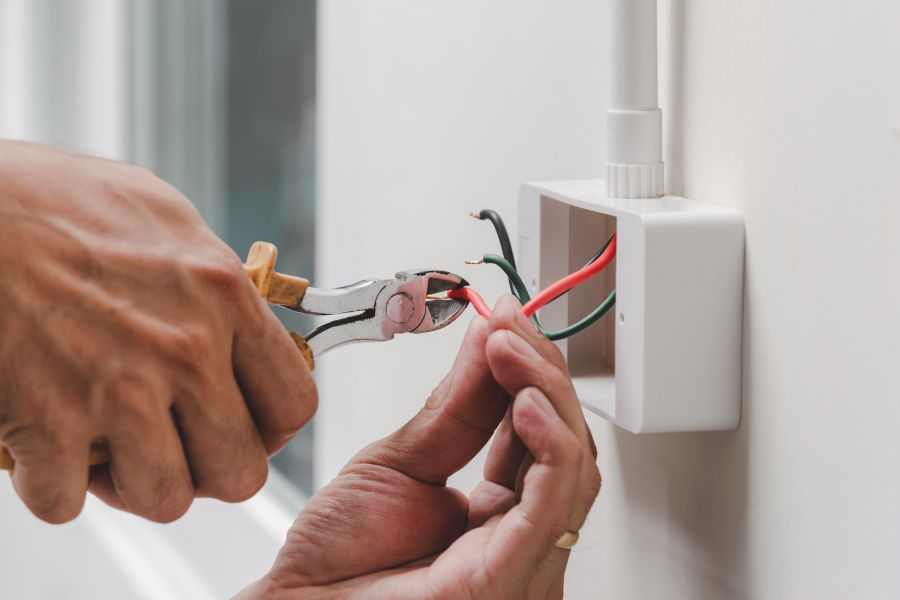
If you’re having flickering lights or frequent electrical surges, it’s time to update your electrical system. Look for outdated wiring in your home as a sign. Prioritize safety and efficiency by modernizing your system. Conduct DIY safety checks by inspecting outlets, switches, and cords. For a thorough job, hire a professional electrician who can provide a detailed rewiring plan. Costs vary based on factors like home size and complexity. Boost safety, efficiency, and home value by updating. More info on signs, importance, safety checks, hiring professionals, and cost considerations is available in the research provided.
Signs You Need Rewiring
If you’re experiencing flickering lights, frequent electrical surges, or outdated wiring in your home, it may be time to consider rewiring. These signs can indicate underlying issues with your electrical system that may pose safety hazards or lead to malfunctions. Flickering lights could result from loose wiring connections or overloaded circuits, while electrical surges may be caused by faulty wiring or outdated components. Outdated wiring, such as knob-and-tube or aluminum wiring, can be a fire hazard and may not meet current building codes.
When considering rewiring your home, it’s essential to hire a qualified electrician to assess the extent of the work needed. They will inspect your current wiring, outlets, and electrical panel to determine the best course of action. Rewiring involves replacing old wiring with new, safer materials to ensure the proper functioning of your electrical system. By addressing these signs promptly, you can prevent potential safety risks and ensure the reliability of your home’s electrical infrastructure.
Importance of Updating Electrical System
When updating your home electrical system, it is crucial to prioritize safety and efficiency by implementing modern technologies and standards. By updating your electrical system, you ensure that your home is equipped to handle the demands of modern appliances and electronics, reducing the risk of electrical fires and hazards. Modernizing your electrical system can also improve energy efficiency, potentially lowering your utility bills. Outdated wiring and components may not meet current building codes or safety regulations, putting your home at risk. Additionally, updating your electrical system can increase the value of your home and make it more attractive to potential buyers.
New technologies such as smart home integration and energy-efficient lighting can enhance the functionality and convenience of your home. Upgrading to a more advanced electrical system can also provide greater control over your energy usage and improve overall home security. By investing in updating your electrical system, you are investing in the safety, efficiency, and value of your home.
DIY Electrical Safety Checks
Updating your home electrical system ensures safety and efficiency; now, let’s focus on conducting DIY Electrical Safety Checks. Before starting any checks, ensure the power is turned off at the main circuit breaker to prevent accidents. Begin by inspecting outlets for any signs of discoloration, burning, or unusual odors, which could indicate wiring issues. Verify that all outlets and switches are working correctly and replace any that are malfunctioning. Check for loose outlets or switches that may pose a fire hazard and tighten them as needed. Additionally, examine electrical cords for fraying or exposed wires; replace damaged cords immediately. Inspect your electrical panel for signs of overheating, rust, or corrosion and make sure all breakers are properly labeled. Lastly, test the functionality of your smoke detectors and carbon monoxide alarms to ensure they are in working order. Regularly conducting these DIY Electrical Safety Checks can help prevent electrical hazards and maintain a safe home environment.
Hiring a Professional Electrician
To ensure a safe and efficient electrical system in your home, hiring a professional electrician is essential. When it comes to rewiring your home, the expertise of a skilled electrician is crucial in ensuring that the job is done correctly and up to code. Professional electricians have the knowledge and experience to assess your current electrical system, identify any issues, and recommend the best course of action for rewiring to meet your home’s energy needs.
A professional electrician will conduct a thorough inspection of your home’s electrical wiring to determine if it needs to be updated. They will also be able to provide you with a detailed plan of the rewiring process, including the materials needed and the timeline for completion. Additionally, hiring a licensed electrician will give you peace of mind knowing that the work is being done safely and up to industry standards.
When selecting a professional electrician, be sure to choose a reputable and certified individual or company with a proven track record of successful electrical projects. By hiring a professional electrician, you can rest assured that your home’s electrical system will be in good hands.
Cost Considerations for Rewiring
For an accurate estimation of the cost for rewiring your home, consult with a professional electrician. The cost considerations for rewiring your home can vary depending on several factors. The size of your home, the complexity of the wiring needed, the accessibility of wiring areas, and the type of materials used all play a role in determining the overall cost. On average, rewiring a house can cost anywhere from $3,500 to $8,000 or more. This cost includes labor, materials, permits, and any additional upgrades that may be necessary. Keep in mind that older homes or homes with outdated electrical systems may require more extensive rewiring, leading to higher costs. It’s essential to get multiple quotes from reputable electricians to ensure you are getting a fair price. Additionally, consider the long-term benefits of rewiring, such as increased safety, energy efficiency, and the added value it can bring to your home.







